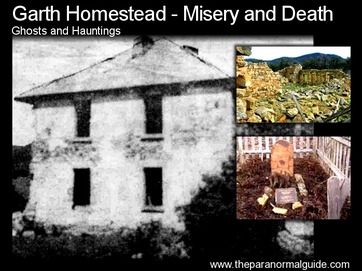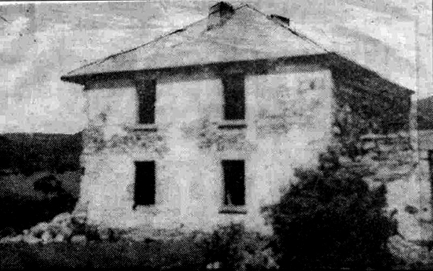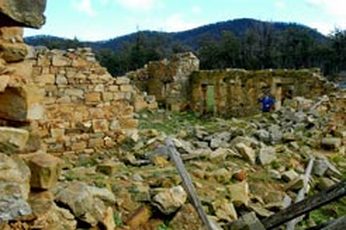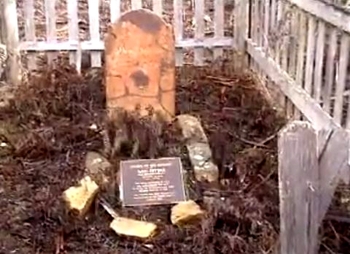
From a rejected mans suicide, to a drowned girl and her nanny, Garth has it all. It is unlived in, as those who have tried have never lasted long, always leaving due to the otherworldly inhabitants that do not like to be disturbed. Who could the spirits be that reside in the ruins?
A Most Haunted Site

Garth Homestead, now part of the Rostrevor Estate, is located along the Esk Highway, in the Fingal Valley just North East of the town of Avoca. What was once a solidly built two storey sandstone building, is now reduced to a set of crumbling ruins, located on a hill looking out over the South Esk River. During the day you may find historic groups looking amongst the ruins, trying to recapture some of the splendour of this very early part of Tasmanias history. By night, the ruins take on a completely different feel, for it is said that Garth is one of the most haunted sites in Tasmania. The ghosts of Garth come in the form of shrieks, moaning and howling of the sad and lost souls that still reside there. Many an investigator and thrill seeker has left the location, in more than a hurry, and it is not just humans that feel the presences. Horses are said to shy away from the location, refusing to take the rider closer than a few hundred meters from the buildings remains, and grazing livestock will not venture near the area.
The First Tragedy

The history of the location has been told through many newspapers, and more than a few books that detail haunted locations around the country. It seems that in the 1950’s, newspapers from around Australia took an interest in promoting the stories of tragedy that marred the otherwise scenic site. Many websites and online journals also detailed the location. The following, is a montage of different versions, from many sources. Most agree on certain aspects, and it is with these that I keep it together omitting one off pieces of information. The story of Garth begins in the early 1830’s when an Englishman (name unknown) travelled to Tasmania and was granted a plot of land. With convict labor, he soon set about building a grand two storey sandstone building, not just out of necessity, but also out of love. The Englishman had left behind the woman he loved, promising her he would be back to collect her once the new home was almost complete. When all but the ceilings and plaster work was complete, he travelled back to England to collect his bride to be. Upon arrival, he learnt that while he was away she had fallen and love and had married another man. Dejected, the Englishman returned to Tasmania and killed himself in the courtyard of his still not completed home.
Further Tragedy

Tragedy was about to strike again, as new owners moved into the home along with their young girl, and her convict ‘nanny’. The nanny was very strict and would threaten the child with being thrown down the well, if she did not behave. The little girl took this very seriously after the nanny had held her over the well by the ankle. One day the girl did cause some sort of trouble, and thinking she knew what was to come threw herself down the well. The nanny, guilt ridden tried to help her charge but also fell in, both dying in the freezing waters. Soon after, a Scotsman named Charles Peters, was granted some land nearby, and in the late 1830’s he also took over the lands containing the Garth house. The home was still very well, kept so Charles Peters moved into the house with his family. In September 1840, Charles Peters two year old daughter Ann ran into the parlour screaming, her hair and clothes were on fire. Ann had been watching the house staff making jams over the fire, when she got too close, and the flame caught her. Ann Peters did not recover from her burns, and her small grave can be seen a little way from the ruins. Charles Peters and his wife left Garth in 1845, after they built the now Historic Fingal Hotel. Garth went to his eldest son who leased it out. The house soon suffered badly during a fire, after which another of Charles Peters’ sons moved in. Thomas Peters restored the house, but near completion another devastating fire went through the building. The building stayed in the Peters family till 1922 though no one has lived in it since the start of the 19th century. Some people may say that the ruins of Garth Homestead are the most famously haunted ruins in Tasmania. Others say that the story and the history surrounding some key deaths is completely unfounded. Many say that either way it makes for a good ghost story. I will leave it up to you to decide.

It’s good history